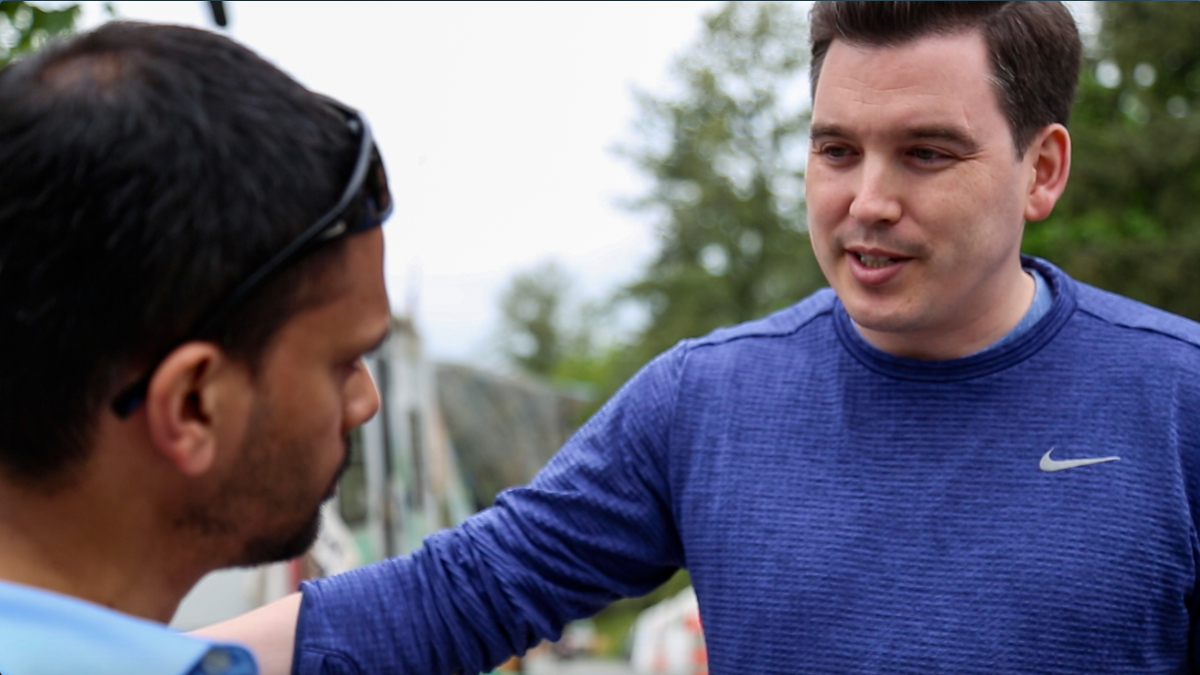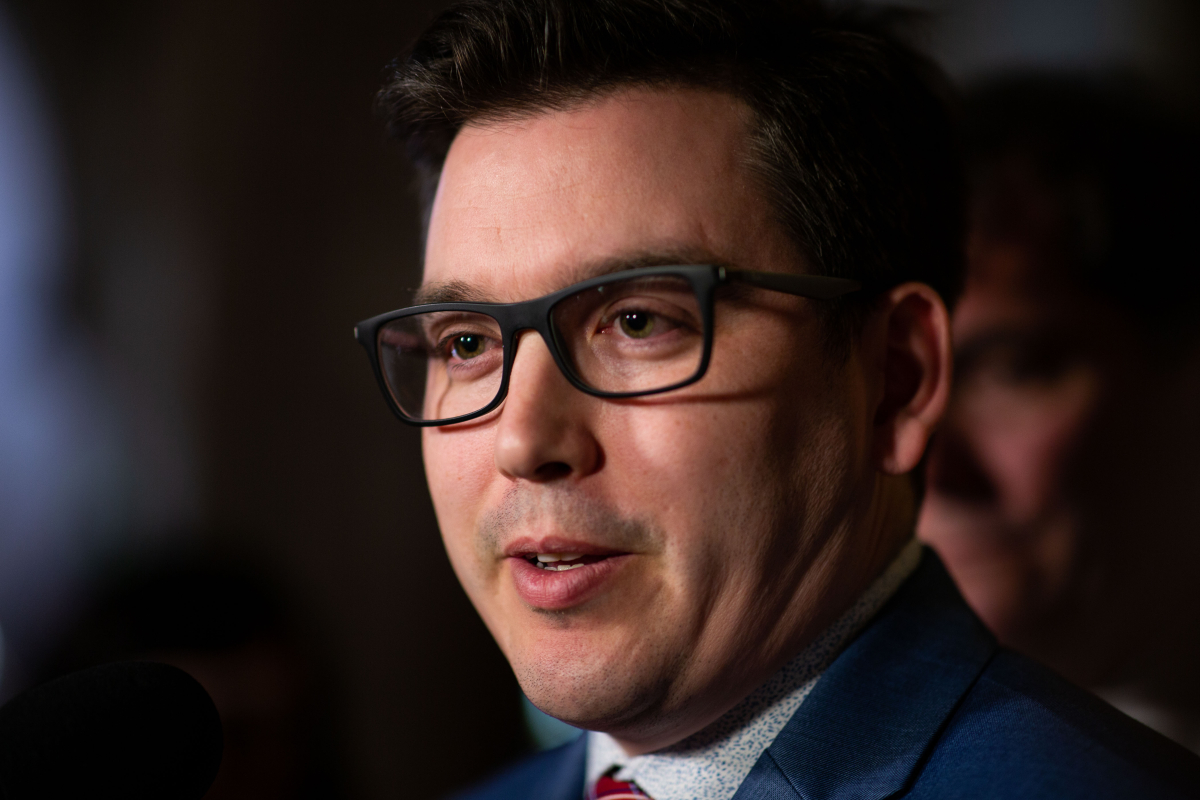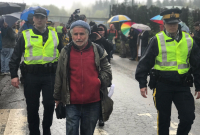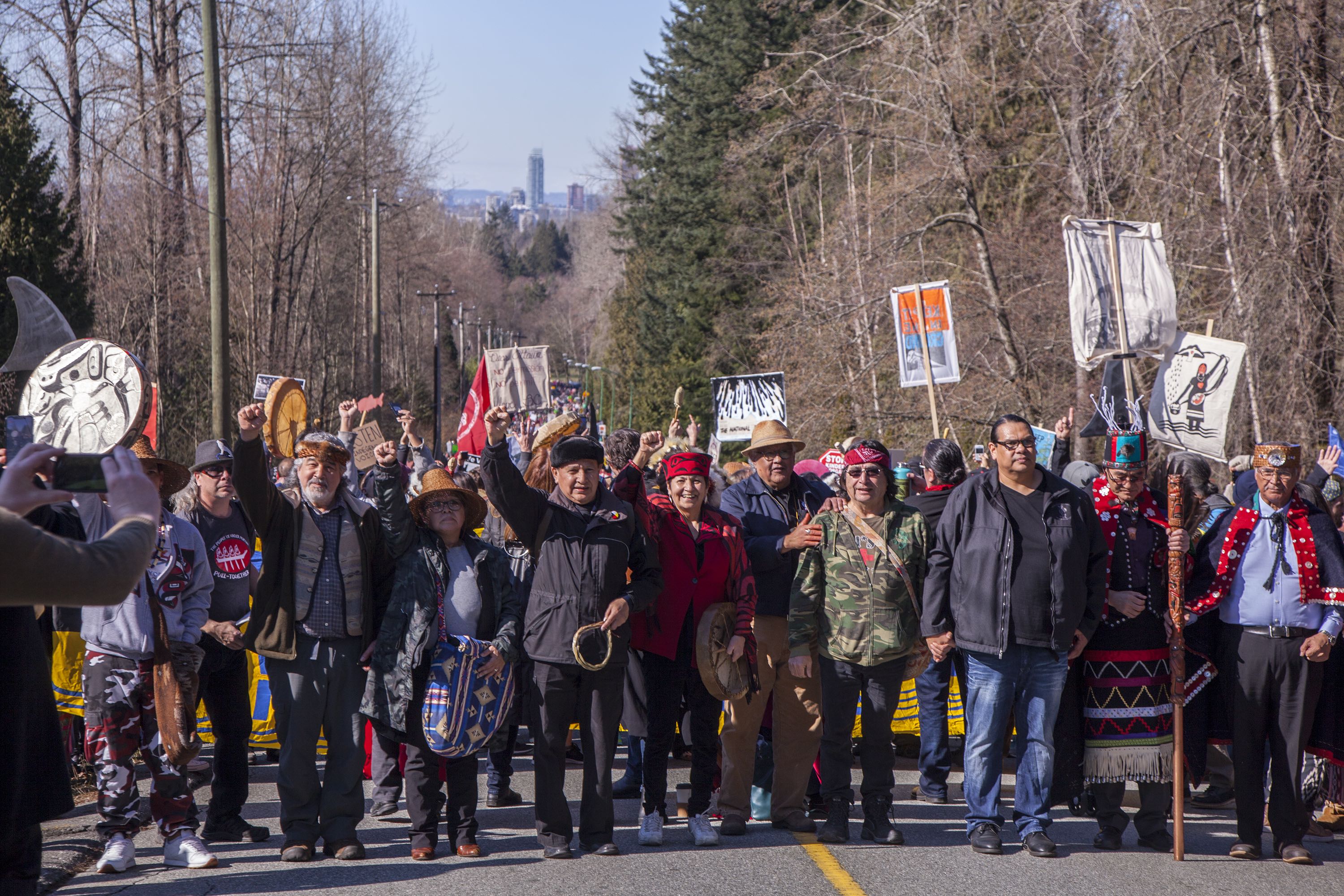Support strong Canadian climate journalism for 2025
Liberal MP Terry Beech wades into the front lines of daily protest on Burnaby Mountain, saying he doesn't want to get arrested but wants to ensure that those who do are treated with respect.
He speaks calmly and confidently about the federal government's approval of Kinder Morgan's Trans Mountain pipeline proposal — a project he has previously voted against in the House of Commons and one that he says the majority of his constituents currently oppose.
Beech has been one of Kinder Morgan’s most outspoken opponents, but he also explains how he is taking a pragmatic approach — now that the project has been approved — to find ways to make it better.
Beech, 37, was elected in 2015 to represent the federal riding of Burnaby North-Seymour in Parliament with just over 36 per cent of the vote in a tight three-way race with the New Democrats and Conservatives not far behind.
He represents an area that is home to pipeline and oil terminal facilities in the City of Burnaby, operated by Texas-based energy company Kinder Morgan. The area could dramatically change if the company goes ahead with the Trans Mountain expansion project to build a new pipeline from Alberta that would feed into a terminal and large oil tankers in the Metro Vancouver suburb.
Beech shows up in casual clothes on a Friday, a few metres away from a gate that marks the limits of Kinder Morgan’s property. He watches as a small group of residents, who have travelled a few hours from the southwestern British Columbia community of Powell River, risk arrest by lining up to block incoming traffic.
He has brought reports to hand out to the people he meets, to ensure they're informed about the status of the project, and his own efforts to engage the government to address environmental and safety concerns.
“I’m here for my constituents,” he says, after being approached by National Observer, and agreeing to do a live interview.

Beech was among a wave of progressive MPs elected across the country as Prime Minister Justin Trudeau’s Liberals surged to a majority government in 2015 on a sweeping platform that included promises to address climate change, to restore public trust in federal oversight of industry and make decisions and policies based on evidence.
Some of the people who voted Liberal, including a man who approaches him on site, believed that this would mean that Trudeau would quash a series of major pipeline project proposals, such as Enbridge’s Northern Gateway, TransCanada’s Energy East and Kinder Morgan’s Trans Mountain expansion.
In reality, the Liberals promised to fix the review process that they said had been tainted by changes to environmental laws introduced by the former Harper government. Two of those pipeline projects, Northern Gateway and Energy East, have subsequently been abandoned.
Trudeau approved the Trans Mountain expansion project in November 2016 and has said it's in the national interest as part of a package of policies and decisions supporting national climate change goals.
The government introduced interim measures that extended the review of the Kinder Morgan project by a few months. Although even this extended consultation was shortened following some lobbying by the company's Canadian chief executive, Ian Anderson, soon after the 2015 election.
Proposals to strengthen environmental laws, reversing changes introduced by the former Harper government, were introduced in February 2018 and were still making their way through the parliamentary approval process as civil disobedience in Burnaby began to escalate. These new laws wouldn't be retroactive, but could come into play for future industrial projects.
Many Kinder Morgan opponents in Beech's riding and beyond believe that Trudeau didn't go far enough to fix the process.
Local environmental groups who are organizing this opposition have told National Observer that they have identified thousands of people willing to be arrested to ensure the project never gets built.
More than 200 people have been arrested since the spring when Kinder Morgan subsidiary Trans Mountain sought and obtained an injunction from the B.C. Supreme Court that prevents people from disrupting construction activity and other operations within five metres of the company’s property.
The arrestees have included two federal MPs, NDP MP Kennedy Stewart, from the nearby riding of Burnaby South as well as Green Leader Elizabeth May, who represents the B.C. riding of Saanich-Gulf Islands.
The federal and Alberta governments have also engaged in secret financial negotiations with Kinder Morgan over the past few weeks to ensure that they don't walk away from the project due to uncertainty caused by opposition from the B.C. government. The Texas energy giant had said that it would abandon the expansion project if it is unable to reach a deal before May 31, 2018.
Terry Beech says 157 conditions on Trans Mountain are 'minimum'
As an MP in the governing party and parliamentary secretary to Fisheries Minister Dominic LeBlanc, Beech says he has had direct access to cabinet to voice the concerns of his constituents.
When he approved the project, Trudeau noted that the expansion would be subject to 157 conditions that were designed by the federal regulator, the National Energy Board, to make the project safe. But Beech says he wants the company and the government to go beyond those conditions.
“There was a discussion up until the decision was made and then there’s how do we react now that the decision has been made and my message to (Jim Carr) the minister of natural resources has always been that those 157 conditions are a minimum standard,” he tells National Observer.
“There’s always opportunities to do better... most people that come into my office are concerned about how we’re going to meet our climate targets, they’re concerned about what’s going on with the tank farm on Burnaby Mountain, and they’re concerned about what happens with marine oil spill response.”
Nearly 60 per cent of Terry Beech's constituents oppose Trans Mountain expansion
Beech’s office recently sent out a survey to 44,000 households in the riding asking them what his top priority should be. Several hundred people mailed in responses to the open-ended query and the results were unequivocal.
Some 58 per cent of the respondents said they were opposed to the expansion project, while 42 per cent supported it. These numbers contrast with other recent public opinion polls, surveying residents across the country, that appear to indicate a majority of Canadians support the pipeline, despite concerns raised by the project's opponents about spills and the potential impact on Canada’s national climate change goals.
The Trans Mountain expansion would triple the capacity of the existing line, allowing the company to ship up to 890,000 barrels of diluted bitumen, the tar-like heavy oil from Alberta’s oilsands region, and other petroleum products to the coast. It would also mean a seven-fold increase in oil tanker traffic, with about one oil tanker departing from the Burrard Inlet, the traditional territory of the Tsleil-Waututh Nation, every day.
The federal and Alberta governments and the oil and gas industry say this project is critical to support growth in the Canadian industry, home to the world’s third largest reserves of crude oil, since it is trying to increase production, while running out of capacity on pipelines to get its product to new markets.
“And all of those considerations, and all of those concerns are on a spectrum,” Beech says. “Some people are opposed to some elements, and some people are in favour of other elements. So I have the job to represent all of those people take all of those complexities and to try to find a path forward for the government.”
Beech makes the comments as RCMP officers move in to arrest some of the land and water protectors who are trying to stop construction activity. One constituent, standing in the background at the start of the interview, also interrupts and repeats the erroneous assumption that the Liberals had promised to stop the project, before Beech corrects him.
The Liberal MP says he is there to make sure they are being treated with respect, but won’t go as far as his colleagues in Parliament, Stewart and May, who were arrested for violating the court injunction.
“As somebody that creates laws, I think it’s our responsibility to follow the rule of law because we expect every other Canadian to follow the rule of law,” he adds. “So you will never see me up here getting arrested. I come up here to make sure that everybody is treated with respect and the like. But the other thing is that there was a very significant due process, and my constituents, as a member of the government and as an officer of the government, expect to me as proficient a member as possible and deliver on a whole threshold of issues.”

'Fine line'
The issue of whether the government respected the rule of law when it approved the project is currently before the Federal Court of Appeal. Several First Nations and local municipalities, Burnaby and Vancouver, have asked the court to quash Trudeau’s decision, arguing that the government failed in its legal duty to consult First Nations, which is required under Section 35 of Canada’s Constitution.
A recent investigation by National Observer prompted an exceptional motion in that case for the court to reopen its evidentiary record, more than six months after the hearings concluded. This motion, introduced by lawyers for the Tsleil-Waututh Nation, requests a court review of internal government documents that were released through access to information legislation. The documents contain allegations from public servants that Trudeau’s process was rigged, that public servants were instructed to find a way for the government to approve the project, while government consultations with First Nations were still underway.
Beech says he doesn’t know what went on behind the scenes, but suggests that the allegations might not be enough to sway the court.
“By the time the decision was made, I’m fully confident that our prime minister, the cabinet had all of the information that they required, in order to make a decision. Now, there’s a lot of people in my riding that aren’t happy about the decision that was made, which is fine. But in terms of whether or not they followed the process, I believe, 100 per cent, that they did,” he says.
“There’s a fine line between making sure that something follows an appropriate process and (saying) let’s find a way to make sure this happens under the appropriate process. Right?
"So what were those conversations? I wasn’t in the room. I don’t know what reporting you’ve done. I don’t know who you were talking to. All I can say is that I have a tremendous amount of respect for the minister of natural resources, I have a tremendous amount of respect for our minister of the environment and climate change (Catherine McKenna) and I have a tremendous amount of respect for our prime minister. And I can tell you with absolute certainty that when I come to caucus with concerns from our community, our cabinet and our caucus not only listen, they respond… It’s hard to ask for much more than that.”
Natural Resources Canada said in a statement that the government is waiting for the court to rule on whether it will accept new evidence in the case. The process could add several weeks to the ongoing uncertainty about the future of the project, and possibly months of delays if the court agrees to review new evidence.
Trans Mountain didn't respond to a request for comment, but it has said in a legal submission that it opposes the motion to reopen the case, noting that this has already caused some unnecessary delays. The federal government also opposes the motion, arguing that the documents would be irrelevant.
Meantime, Beech said he’s hard at work trying to address the range of issues on the Liberal agenda, including affordable housing, protecting the oceans and fighting climate change.
“You have to do that from within government in a way that you can be personally be effective," he adds. "So that’s why I went through all the panel hearings. That’s why I presented, when the detailed route hearings came through. I’m the only member of Parliament that’s in those meetings. That’s what I think my constituents expect of me, so I’m going to continue to do that.”
with files from Dylan Sunshine Waisman
Editor's note: This article was updated at 5:25 p.m. ET to clarify that Terry Beech has previously voted against a motion in the House of Commons that said the Trans Mountain project had a social licence to proceed and would be good for both the environment and the economy.






Comments
It's fine to have a tremendous amount of respect for your colleagues in government, but have you listened with a tremendous amount of respect to those scientists who are researching and publishing on climate change, Mr. Beech? Do you have a tremendous amount of respect for the next generation of Canadian citizens, who are going to face escalating costs and harms, for the sake of selective profits, largely confined to corporations, many of them offshore? How about your respect for the hundreds who just lost their homes to floods in the Interior? Those who lost their homes last summer in the latest record wildfires? Those who will lose their homes and livelihoods this coming summer, as the Interior is experiencing July temperatures in May? Those politicians you tremendously respect have yet to demonstrate a tremendous amount of knowledge about the risks and costs of climate change, which dramatically offset the "national interest" in continuing to try to profit from a damaging industry, which should have had its day by now.
The fossil fuel and pipeline special interest groups have followed the same strategy as the tobacco industry, to obscure the science by pretending there remain reasonable doubts, taking advantage of the comfort citizens have, in thinking there's no need to make inconvenient changes, and of the general low level of comprehension of science. Shame on our governments for buying into the lies and haze, when they've been gamed like this for decades before. This is not a new playbook. The Trudeau Liberals are willing sellouts to industry, well-intentioned or not.
Just because you're hearing criticism from "both sides" does not mean you're in the middle.
Please read my two reports here: http://terrybeechmp.ca/2018/03/23/a-message-to-defendthewater-participa…
Best - Terry
Having attended all the pipeline hearings in the lower mainland too, I can honestly say that there's a HUGE difference between delivery of pleasant-sounding words and stats, and actual ACTION! What people are demanding now is the latter! So until you and your government DELIVER meaningful action, and dollar amounts do not constitute real action, we will continue to congregate on Burnaby mountain and elsewhere until you do the right thing and STOP THE KINDER MORGAN PIPELINE AND TANKER PROJECT!!
Thank you.
Typical Liberal. You can be against something, but then when the boss approves it you have to pretend it's OK because the reality of it being a bad idea is not as important as the reality of going along to get along if you ever want a cabinet seat.
Nearly 60 per cent of Terry Beech's constituents oppose the Trans Mountain expansion. But this doesn't mean Terry Beech votes with his constituents. As a true sycophant, he votes with his Leader and his constituents can go to h#!!.